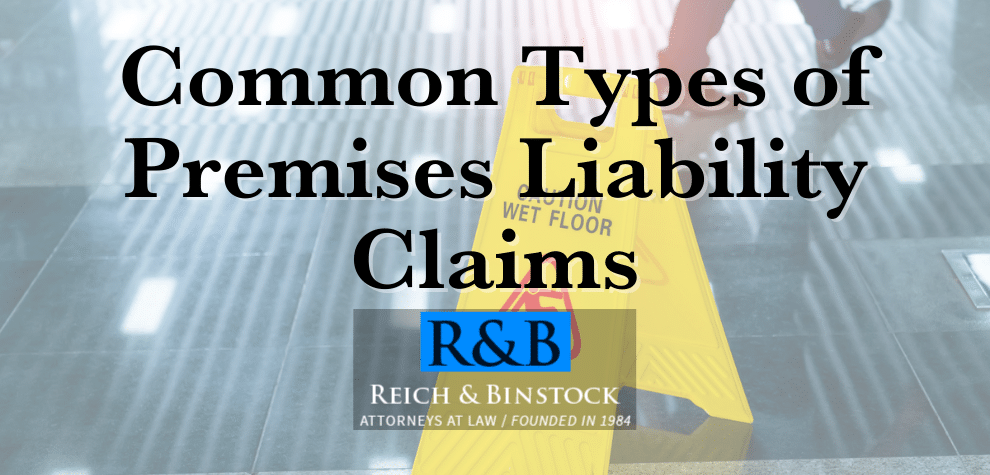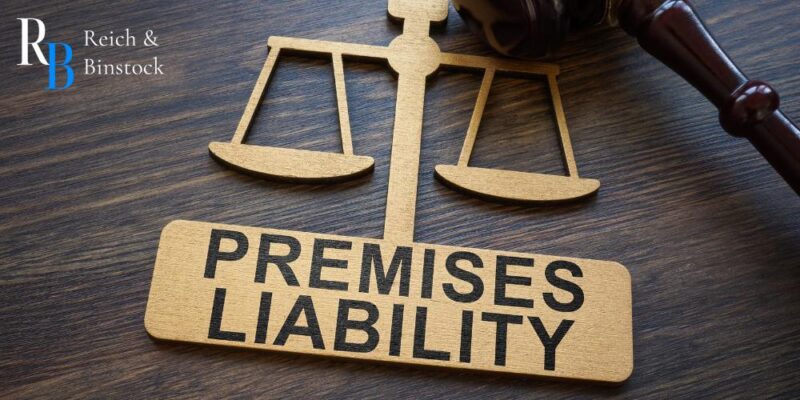In Texas, premises liability law holds landowners liable for any injuries that occur on their property while they are aware of someone’s presence. This covers situations where someone is on their property legally but without their permission or when someone trespasses with the knowledge of the landowner. Landowners have an obligation to preserve their property as hazard-free, even if someone trespasses. One example is a neighbor utilizing their property as a shortcut. Texas has multiple different types of premises liability claims, and Reich & Binstock knows how to handle them all.
At Reich & Binstock, we recognize that accidents happen. When you sustain injuries as a result of someone else’s negligence, the entire experience has the potential to be highly frustrating. After a situation like this occurs, you need qualified representation on your side. With our experience, you can rest assured that you’ll be in good hands. To schedule a free consultation with us, please call 713-622-7271 or fill out our online intake form. Our experienced Houston personal injury attorneys will fight aggressively for your right to fair compensation.
What Are Common Types of Premises Liability Claims?
Premises liability is a legal phrase that describes the obligation that every property owner bears when visitors come to his or her home. If the property is neglected or dangerous, resulting in illness or damage to a renter or visitor, the owner may be held responsible for the harm the person has suffered as well as related expenditures.
The majority of personal injury lawsuits, including premises liability cases, are founded on negligence. The injured individual must show that the property owner was negligent in the ownership or maintenance of the property in order to win a premises liability lawsuit. In general, negligence refers to the failure of the property owner to exercise due care in relation to the property.
Poor Security
When you work for or frequent a business, that business is accountable for providing a safe environment in which to conduct business. When staff or customers are hurt in a break-in, robbery, or vandalism, the security of the firm is questioned. If the firm’s security was insufficient, the corporation may be held responsible for the injuries that resulted.
Poor Maintenance
If not properly maintained, many different types of architectural elements can become harmful. Appliances, light fixtures, and elevators all fall under this category. The landlord or building management can be held responsible if an elevator or appliance malfunctions (due to a lack of maintenance) and injures a resident or visitor, such as an elevator falling unexpectedly and someone striking their head.
Slip and Fall Accidents
The most prevalent form of premises liability suit is a slip and fall accident. When a property owner or management fails to properly maintain walkways, stairwells, or parking lots, this might happen. The owner can be held responsible if someone slips and falls due to snow or ice, damp flooring that isn’t designated with warning signs, or misplaced cables.
Uncontrolled Dogs or Animals
Owners of property have a responsibility to keep their dogs under control, especially if the animal has aggressive inclinations. If a dog injures someone as a result of the owner’s lack of training, lack of a fence, or failure to leash the dog, the owner is liable for any damages caused by the dog.
Other Types of Premises Liability Claims:
- Accidents related to snow and ice
- Defective conditions of the premises
- Escalator or elevator accidents
- Drowning accidents
- Theme park or amusement park accidents
- Fires
- Flooding or water leaks
- Chemicals or toxic substances
As shown above, there are countless types of premises liability claims. Even dog bite injuries fall under this umbrella, as they often involve danger on someone else’s property. One recent toxic exposure case involves the Camp Lejeune water contamination. If you have questions about your situation or if you wonder whether or not you have a case, feel free to contact Reich & Binstock today.
Common Causes of Premises Liability Lawsuits
Some slip-and-fall incidents may result in just minor injuries. Bruises, scratches, lacerations, and fractured bones are unlikely to cause permanent or irreversible harm, but they can be grounds for a premises liability claim.
Gas explosions, slip-and-fall accidents, amusement park mishaps, animal assaults, and other disasters can permanently cripple or disfigure people, altering the lives of the injured and their families for the rest of their lives. Catastrophic injuries inflict significant physical, emotional, and psychological harm, and they frequently need intense, long-term medical care. The following are examples of common catastrophic injuries.
Can a Trespasser Who Suffered Injuries Sue the Property Owner?
An injured individual who sustained those injuries while trespassing can pursue a premises liability claim in particular and restricted situations. While this may appear to be an odd legal loophole, the definitions of three categories of property visitors will help to explain why trespassers may be allowed to bring a claim. Texas law describes three types of visitors on a property.
- Invitees: We expect invitees to be on a property. Examples include guests to a home, patrons at a place of business, restaurant goers, and those at amusement parks.
- Licensees: These visitors go to a property to help the owner in some way. Examples include plumbers or other types of repairmen.
- Trespassers: These visitors generally enter the property without the consent of the owner, or illegally. Trespassers might be someone who hops a fence to secure a shortcut or who refuses to leave the property when asked to do so.
The duty of a property owner varies based on a person’s position. Property owners must check their property for invitees and rectify any risks or notify them of any concerns. A comparable obligation also applies for licensees. Property owners must simply notify people of potential hazards.
Finally, because they have no means of knowing when trespassers are on their land, it is not necessary for property owners to notify trespassers of hazards. Only if a property owner deliberately hurts a trespasser is a trespasser owed safety. Property owners, for example, cannot use pre-set traps to injure trespassers. Similarly, property owners are prohibited from attacking or harming trespassers who do not pose a threat to them.
Does Premises Liability Apply Even to Crimes Committed on the Property?
Yes, premises liability can play a role in crimes involving violence on properties, such as fatalities and injuries. This is particularly true in locations with a large number of guests, such as apartment complexes. Apartment owners must have security in place to safeguard their invitees, which includes both residents and visitors. If an apartment owner fails to create a safe building that allows for the possibility of violence, they may hold liability for any injuries or fatalities that occur as a result.
How Can Property Owners Protect Themselves from Premises Liability Lawsuits?
To defend oneself from premises liability litigation, property owners should first ensure that they properly maintain their property. It just takes a few little errors in property care to allow a big problem to develop.
Next, property owners should display warnings for any potential hazard that visitors may face. If your facility is in the process of construction, make sure to display warnings about exposed rebar, ditches, holes, and other frequent risks. Alternatively, if your property contains inherent permanent risks, it is still your responsibility to publish warnings about them, no matter how evident they appear.
A property owner might get liability insurance for extra protection. Because every property exists for a different purpose, it’s essential to consult an insurance professional to figure out what kind of coverage you need for your property. Many insurance firms provide plans for certain types of properties, such as farms and restaurants.
What Is the Recreational Use Statute?
Property owners who open their premises for recreational activities receive protection under the Recreational Use Statute. This legislation implies that leisure activities, such as some sports, have inherent and unexpected risks that property owners cannot mitigate. However, because this legislation does not always apply, anybody wounded while participating in a leisure activity should seek legal advice.
What Is the Agritourism Act?
If a person sustains injuries while participating in agritourism, the Agritourism Act helps to restrict a landowner’s responsibility. Allowing visitors to visit a farm, ranch, or other sort of agriculture business for the purpose of tourism and additional cash generation is agritourism. If an agricultural landowner has posted warnings or had guests sign a waiver, this legislation restricts their responsibility. This legislation, like the Recreational Use statute, isn’t always applicable, therefore claimants should contact an attorney to examine their alternatives.
What Must You Prove in a Premises Liability Claim?
Only if the case meets specific conditions may injured persons hold landowners responsible for harm. To start, they must establish that the landowner was aware of the conditions that resulted in the harm. Then, there must exist a harm produced by an unreasonably high danger. Reasonable risks, on the other hand, are hazards which result from weather (which is beyond the landowner’s control). Finally, if landowners are aware of an issue, they have a responsibility to address it. If a landowner is aware of a problem but cannot remedy it right away, they must identify dangers with prominent warnings.
What Damages Can I Receive in a Premises Liability Claim?
Victims harmed on another’s property may receive compensation for medical expenses, lost earnings, pain and suffering, and punitive damages, among other things.
Contact Reich & Binstock Today
The laws governing premises liability are complex and differ from state to state. As a result, you need to contact an attorney to guarantee that your rights are fully secure. A premises liability lawyer with Reich & Binstock can assess your case and advise you on the best line of action to take. To schedule a free consultation with us, please call 713-622-7271 or fill out our online intake form today.















